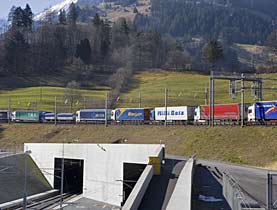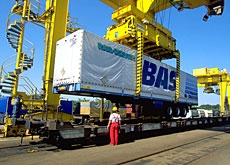Alpine freight policy remains in a smog

The government is being accused of dragging its feet on implementing a key environmental goal to reduce the amount of freight crossing the Swiss Alps by truck.
Green groups say the government must act immediately to move freight from road to rail. The constitution limits the number of transalpine trucks to 650,000 a year but there are currently twice as many, and the figure is growing.
Swiss voters approved a constitutional amendment in 1994 introducing the limit, and a few years later parliament approved a target date of 2009.
At the time of the vote, the Swiss rallied around inhabitants of alpine valleys who saw transalpine trucks as a major risk to the environment and their health, since the harmful emissions are trapped by the valley walls.
The government has taken action and has invested heavily in new rail tunnels and railway infrastructure, increasing the amount of goods transported by rail, which is now equivalent to 65 per cent of the total freight crossing the Swiss Alps.
However, transalpine road freight has also been growing – increasing by more than nine per cent in the first half of last year alone.
Watered down
The government and parliament have recently tabled various plans to water down the amendment, upping the maximum number of transalpine trucks permitted, and putting back the implementation date by several years.
But on Thursday, the Alpine Initiative lobby group, along with Greenpeace and the World Wide Fund for Nature, said there was no reason to weaken the targets or delay the implementation.
They reiterated their call for the introduction of a so-called Alpine Crossing Exchange – essentially an online reservation system where haulage companies would bid for the rights to use alpine routes.
The scheme would use a quota system, defining the maximum number of journeys allowed per year on each alpine route.
“The Exchange was mentioned in the European transport white paper where it’s described as an excellent instrument for sensitive regions [such as the Alps],” Toni Aschwanden, responsible for international policy at the Alpine Initiative told swissinfo. “And studies commissioned by the Swiss government show that it’s feasible.”
Resignation
The environmentalists have resigned themselves to the fact that Switzerland will miss the target date of 2009.
“We have to accept that the government is far behind schedule,” said Kaspar Schuler, director of Greenpeace Switzerland.
“If the government were to act now, and did not wait for support from the European Union, implementation could be completed by 2010. That means the shift [from road to rail] as demanded by the constitution could be achieved by 2012,” Schuler told swissinfo.
Not surprisingly, Switzerland’s road hauliers association, Astag, is opposed to the restrictions.
Strangle trade
André Kirchhofer of Astag told swissinfo the target date – even if it is moved back to 2017 as has been mooted – was “totally unrealistic”. Astag also claims that limiting the number of truck journeys to 650,000 would strangle important trade with Italy, Switzerland’s southern neighbour.
Astag rejects the notion that Switzerland’s railways could carry the additional amount of freight if Switzerland were to meet its goals.
That is why the Alpine Initiative has called on the authorities to maintain railway infrastructure subsidies in order to increase capacity.
Despite the ongoing debate, Switzerland is the envy of its neighbours.
For example, about two million trucks crossed Austria’s Brenner Pass alone last year, which was an increase of more than five per cent from 2006.
swissinfo, Dale Bechtel
The Alpine Initiative group was founded in 1987 and claims to have about 50,000 members and supporters.
It aims to protect the alpine environment from increasing road traffic.
The group forced a nationwide vote on the issue, which was approved by the Swiss voters in 1994.
As a result, parliament and the government decided to introduce fees for heavy-goods vehicles, increasing the maximum weight of trucks from 28-40 tons and subsidising tickets for trucks which use rail transport.
The group also helped defeat a proposal in 2004 to build a second road tunnel through the Gotthard in central Switzerland.

In compliance with the JTI standards
More: SWI swissinfo.ch certified by the Journalism Trust Initiative




You can find an overview of ongoing debates with our journalists here. Please join us!
If you want to start a conversation about a topic raised in this article or want to report factual errors, email us at english@swissinfo.ch.